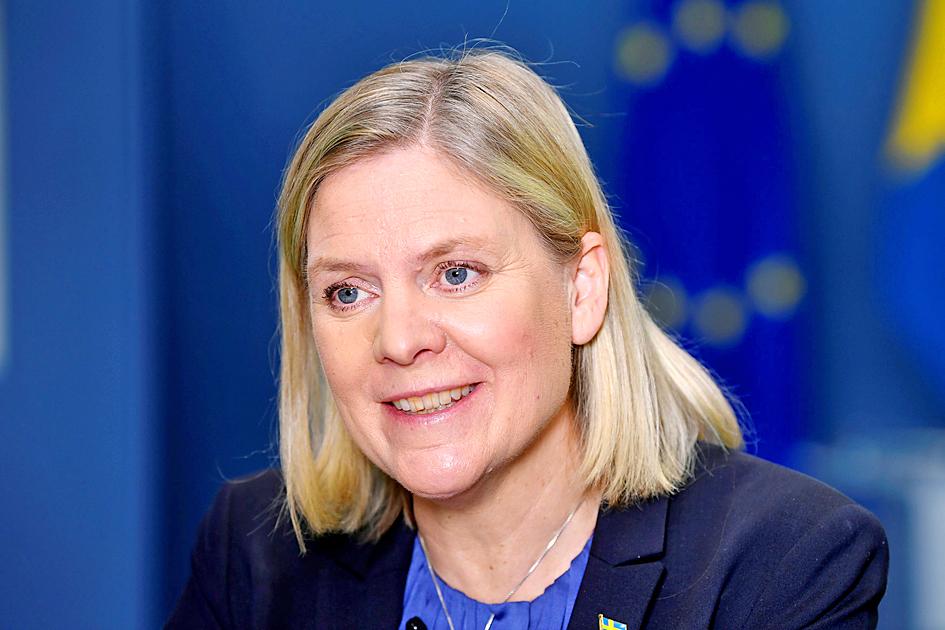The head of the IMF on Monday said that the global lender needed more resources to help heavily indebted countries, citing a highly uncertain global economic outlook and a growing divergence between rich and poor countries.
IMF managing director Kristalina Georgieva, who has long advocated a new allocation of the IMF’s own currency, Special Drawing Rights (SDRs), said that doing so now would give more funds to address the health and economic crises, and accelerate moves to a digital and “green” economy.
Under US President Donald Trump, the US, the IMF’s largest shareholder, blocked such an SDR allocation, a move akin to a central bank printing money, as it would provide more resources to richer countries because the allocation would be proportionate to their shareholding.

Photo: Reuters
Swedish Minister of Finance Magdalena Andersson, the new chair of the International Monetary and Financial Committee speaking at an online news conference with Georgieva, said that it was clear the need for liquidity remained great, and she would consult with member countries on options for expanding liquidity.
Andersson, the first European to head the IMF’s steering committee in more than 12 years, and the first woman, started her three-year term on Monday.
Georgieva said that the IMF had rapidly increased concessional financing to emerging market and developing economies, including through donations by member countries of about US$20 billion in existing SDRs.
That would continue to play an important role, but further steps are needed, she said.
“It will continue to be so important, even more important, for us to be able to expand our capacity to support countries that have fallen behind,” Georgieva said.
A new SDR allocation had never been taken off the table by IMF members, she said, adding that some members continued to discuss it as a possible move.
A possible sale of gold from the IMF’s reserves would have “some opportunity costs” for the IMF, but would be up to members, she said.
She said that she expected the G20 major economies to extend the moratorium in official debt service payments by the poorest countries, now slated to end in June, but much would depend on the pace of COVID-19 vaccinations in coming months.

The US dollar was trading at NT$29.7 at 10am today on the Taipei Foreign Exchange, as the New Taiwan dollar gained NT$1.364 from the previous close last week. The NT dollar continued to rise today, after surging 3.07 percent on Friday. After opening at NT$30.91, the NT dollar gained more than NT$1 in just 15 minutes, briefly passing the NT$30 mark. Before the US Department of the Treasury's semi-annual currency report came out, expectations that the NT dollar would keep rising were already building. The NT dollar on Friday closed at NT$31.064, up by NT$0.953 — a 3.07 percent single-day gain. Today,

‘SHORT TERM’: The local currency would likely remain strong in the near term, driven by anticipated US trade pressure, capital inflows and expectations of a US Fed rate cut The US dollar is expected to fall below NT$30 in the near term, as traders anticipate increased pressure from Washington for Taiwan to allow the New Taiwan dollar to appreciate, Cathay United Bank (國泰世華銀行) chief economist Lin Chi-chao (林啟超) said. Following a sharp drop in the greenback against the NT dollar on Friday, Lin told the Central News Agency that the local currency is likely to remain strong in the short term, driven in part by market psychology surrounding anticipated US policy pressure. On Friday, the US dollar fell NT$0.953, or 3.07 percent, closing at NT$31.064 — its lowest level since Jan.

The New Taiwan dollar and Taiwanese stocks surged on signs that trade tensions between the world’s top two economies might start easing and as US tech earnings boosted the outlook of the nation’s semiconductor exports. The NT dollar strengthened as much as 3.8 percent versus the US dollar to 30.815, the biggest intraday gain since January 2011, closing at NT$31.064. The benchmark TAIEX jumped 2.73 percent to outperform the region’s equity gauges. Outlook for global trade improved after China said it is assessing possible trade talks with the US, providing a boost for the nation’s currency and shares. As the NT dollar

The Financial Supervisory Commission (FSC) yesterday met with some of the nation’s largest insurance companies as a skyrocketing New Taiwan dollar piles pressure on their hundreds of billions of dollars in US bond investments. The commission has asked some life insurance firms, among the biggest Asian holders of US debt, to discuss how the rapidly strengthening NT dollar has impacted their operations, people familiar with the matter said. The meeting took place as the NT dollar jumped as much as 5 percent yesterday, its biggest intraday gain in more than three decades. The local currency surged as exporters rushed to